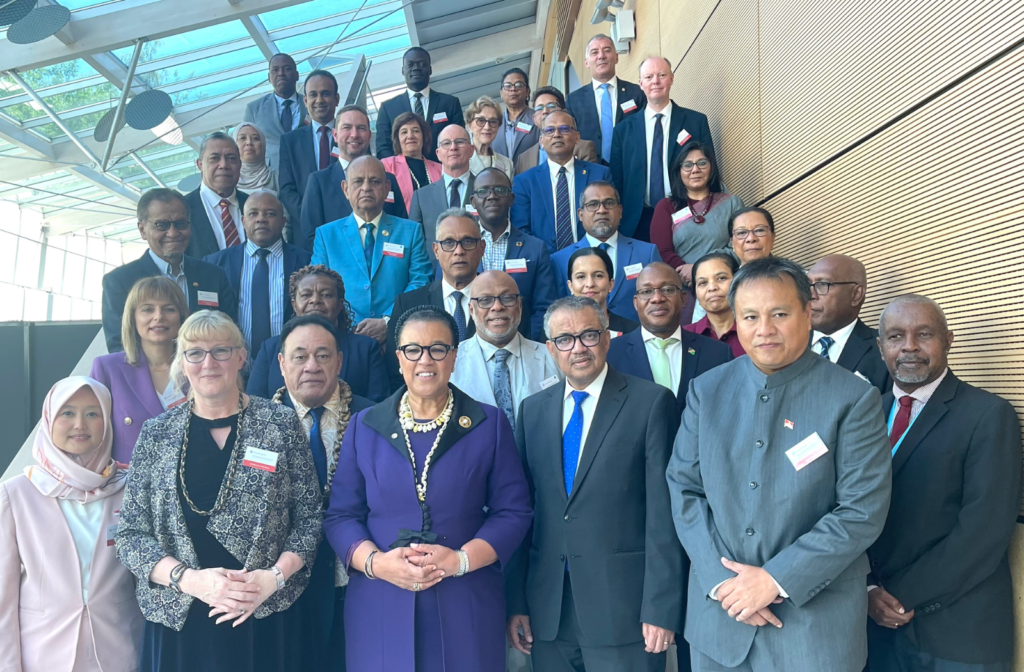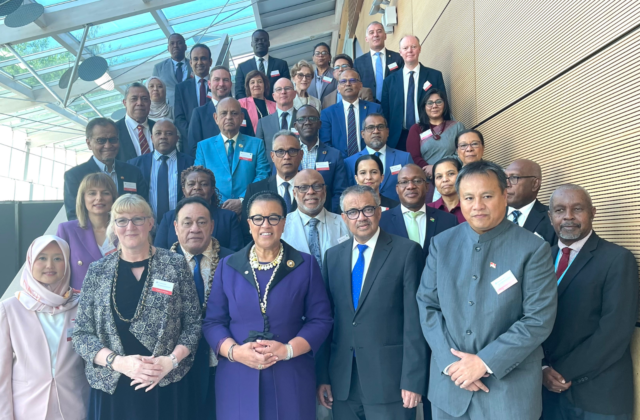
The Commonwealth health ministers have come together to pledge a joint action to help create resilient health systems for small and vulnerable states.
Commonwealth health ministers and senior officials have concluded a critical meeting in Geneva, Switzerland, held from 24 to 25 May 2024, with firm commitments to accelerate efforts to prepare and respond to future health shocks and stressors.
The 36th Commonwealth Health Ministers Meeting (36CHMM) provided a platform for ministers and senior officials to discuss actionable solutions to build health system resilience. The deliberations, which paid particular attention to the issues faced by small and vulnerable states, included the need for developing climate-resilient health systems, tackling global and national shortfalls of health and care workers and addressing the Commonwealth’s rising burden of non-communicable diseases (NCDs).
Overcoming geographical vulnerabilities
Chaired by the Government of Kiribati and bringing together over 40 ministers and heads of delegation, the CHMM made a range of commitments, including taking action with Ministries of Environment to build climate-resilient health systems, an agreement to overcome the negative impacts of international migration of health workers, and working together to implement the 2023 UN Political Declarations on Universal Health Coverage, Pandemic Preparedness, Prevention, and Response and Tuberculosis.
The Commonwealth Secretary-General, Rt Hon Patricia Scotland KC, affirmed the escalating threats to health and wellbeing, particularly for small and vulnerable states, in her opening remarks:
“Our ability to prepare for shocks, but also to minimize the negative consequences of such disruptions, and recover and adapt, is one of the biggest indicators for how we can protect and promote the health and wellbeing of our populations. And among those most at risk are small and vulnerable states.
Characterized by structural and geographic vulnerabilities, limited resources, and at a higher risk of exogenous shocks and stressors, small and vulnerable states face a myriad of challenges which underscore the importance of strengthening health systems to withstand and respond to emergencies.”
A new bold and visionary path to combat health emergencies
In his opening address, the Chair of 36CHMM, the Hon Dr Tinte Itinteang, Kiribati’s Minister of Health and Medical Services said:
“Let us seize this moment to chart a bold and visionary path forward for the Commonwealth – one that places resilience at the center of our health agenda, empowers individuals and communities to take charge of their health, leaves no one behind, and extends a special hand of solidarity to our small and vulnerable states.”
Addressing the priorities of the meeting in a keynote address, the Director-General of the World Health Organisation, Dr Tedros Adhanom Ghebreyesus, spoke about the significant health challenges in small island developing states (SIDS). He said:
“These countries face significant health challenges, including high burdens of non-communicable diseases, mental health conditions, and increased vulnerability to health emergencies and the impacts of climate change. We need to support the SIDS in their efforts to strengthen their health systems, including through improved access to development assistance and financial and technical support.
The leadership of the Commonwealth will be critical in the months and years ahead as we work together to promote, provide and protect the health of the world’s people”.
New pandemic agreements
A Senior Officials Meeting held on Friday, 24 May, provided an opportunity for senior officials to be briefed on the CHMM agenda, expected outcomes and ministerial statement. It also provided an opportunity to update delegates on the Commonwealth Advisory Committee on Health (CACH) and the Commonwealth Secretariat’s Health Programme of Work.
The ministerial meeting was held just ahead of the 77th World Health Assembly (WHA), hosted by the World Health Organization (WHO). The CHMM Chair in Office will present a statement on behalf of the 56 Commonwealth health ministers during the WHA.
The ministerial meeting coincided with the final stages of negotiations on the Pandemic Agreement and International Health Regulations (IHR) targeted amendments, which aim to strengthen global capacities to respond to future pandemics and outbreaks in the wake of the COVID-19 pandemic.
The road to CHOGM
The CHMM was a crucial precursor to the Commonwealth Heads of Government Meeting (CHOGM), which will be held from 21 to 25 October 2024 in Apia, Samoa. With its theme “One Resilient Common Future: Transforming our Common Wealth,” CHOGM provides an important opportunity to put issues of resilience on the Commonwealth agenda.
As part of the outcome statement, health ministers made a range of requests for deliberation and action at CHOGM, including:
- A recommitment to the Commonwealth targets on cervical cancer, malaria, neglected tropical diseases and antimicrobial resistance
- To support an increase in the availability of adaption finance dedicated to health, with a focus on building climate resilient health systems in countries most vulnerable to climate change, including SIDS
- To commit to strengthening the global health architecture, including enhancing equity, through the continuation of negotiations on the Pandemic Agreement and targeted amendments to the IHR
The CHMM discussions will also be a focus of the Commonwealth Secretary-General’s attention at the Fourth International Conference on SIDS in Antigua and Barbuda this week.
There, the Commonwealth Secretariat’s team will amplify the concerns and needs of these nations, particularly SIDS, by addressing critical challenges such as the rising burden of NCDs, the climate crisis, access to climate finance, biodiversity loss, and spiralling debt through practical and impactful solutions.






